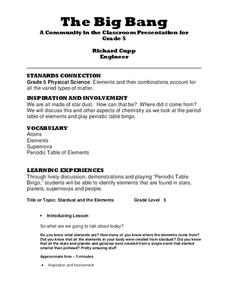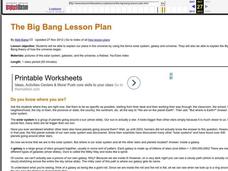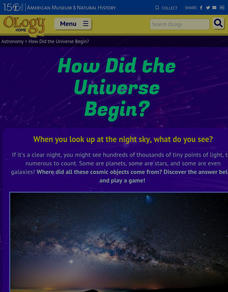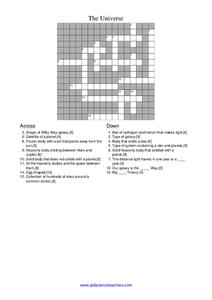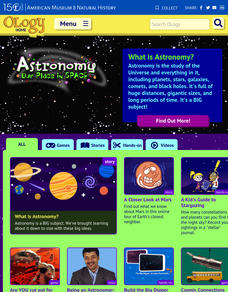School Science
The Big Bang Time Machine
Scholars take off on an interactive spaceship to explore a historical timeline of the big bang theory. They learn about the evolution of mammals and humans, the formation of stars and planets, and the chemical composition of the early...
Curated OER
Learning from Light: The Big Bang
High schoolers explore what astronomers are able to examine our galaxy and universe by examining light. They explore in this sub-unit the formation of the universe, commonly called "The Big Bang," and it follows studying from the Light:...
Virginia Department of Education
Modeling the Big Bang Theory
Young astronomers learn about the Big Bang Theory and redshift through a hands-on activity in the last installment of a three-part series. Participants draw dots on balloons and then inflate them to model how galaxies moved farther apart...
Curated OER
The Big Bang
Fifth graders relate the elements in the human body to those produced during a supernova. In this space science and chemistry instructional activity, 5th graders listen to a lecture and view visuals about the big bang. They relate the...
Curated OER
The Big Bang
Students explore our universe. In this solar system instructional activity, students gain knowledge about the solar system, galaxy, the universe and the Big Bang Theory. Students watch videos and view a slideshow.
Adrian College
The Universe
Young scientists create a simulation of Hubble's law. Introducing the Big Bang Theory using balloons and a simple lab worksheet, scholars complete a data table and perform analysis.
Curated OER
Integrating Space Science-Our Changing Universe
In this universe worksheet, learners read about the big bang theory and the evolution of the stars from the elements. Students answer four critical thinking questions about the beginnings of our universe.
Curated OER
Exploring Big Bang Evidence
Ninth graders study the Big Bang theory. In this big bang theory activity students research the Internet and complete several activities and create a presentation.
American Museum of Natural History
How Did the Universe Begin?
The Big Bang Theory is more than a television show. Pupils read how Edwin Hubble observed other galaxies and noticed that the galaxies are moving away from each other. Scholars learn about the idea of the big bang and what happened next...
American Museum of Natural History
What Do You Know About the Universe?
The universe is full of a mystic matter people cannot see. Pupils respond to 10 questions about the stuff in the universe. Most of the questions involve the big bang theory and dark matter. Learners find out how astronomers have found...
Curated OER
Understanding the Cosmic Microwave Background (CMB)
How did our universe really begin? Explore the Science Big Bang Theory and Cosmic Microwave Background (CMB) with this multiple activity-based lesson that demonstrates that the increase of density due to the decrease of temperatures,...
Glynn County School System
Cosmology
The past, the present, and the future ... there's so much to discover about the galaxy. Scholars learn about the creation of the universe, its current structure, and how it is changing. The PowerPoint presentation begins with a...
Mr. E. Science
Stars, Galaxies and the Universe
It takes 225 million years for our sun to travel around the galaxy. The presentation covers astronomical units, light years, telescopes, types of stars, the life cycle of a star, and types of galaxies. This is the last lesson in a...
Curated OER
Scavenger Hunt: Who am I?
In this solar system worksheet, students use an on line source to find the names of the people who discovered the planets, comets, asteroids, black holes and the idea of the big bang theory.
Curated OER
Astronomy
In this astronomy worksheet, students find fifty one words in a word search that are related to comets, galaxies, planets, moons, stars and the tides.
Curated OER
The Universe
In this space science worksheet, students use the clues given at the bottom of the sheet to complete the crossword puzzle relating to the universe. There are 16 clues to solve in the puzzle.
American Museum of Natural History
Planetary Mysteries
A website all about planetary mysteries—it's a one-stop-shop for all things, stars, planets, and space travel. Scholars read an astronomy overview to discover the page's big ideas, then choose from the plethora of resources, including...
Curated OER
Scavenger Hunt: Who am I?
In this space science worksheet, learners use the sites listed on the Solar System and Planets page of the Kid Zone to locate the names of the people credited with each discovery. They identify and name 26 different scientists who made...
Curated OER
History of the Universe
Learners describe how the universe was formed. In this astronomy lesson, students listen and respond to questions in a PowerPoint lesson that includes various theories about how the universe was created.
NASA
Raisin Bread Universe
What is the universal breakfast? The resource includes two activities, the first one observing oatmeal to understand the texture of the universe. Then, scholars measure raisin bread dough before and after it rises to represent the...
American Museum of Natural History
What Do You Know About Astronomy
Develop an understanding of the universe. Learners answer 10 multiple choice questions about several topics in astronomy. Questions contain information about the age of the universe, gravitational attraction, galaxies, planets and comets...
Core Knowledge Foundation
Astronomy—Our Solar System and Beyond Tell It Again!™ Read-Aloud Anthology
A read-aloud anthology explores our solar system and beyond. Informational texts about astronomy invite pupils to discuss readings. Extension activities examine vocabulary, sayings, and phrases. Scholars work through the writing process...
Curated OER
Astronomy
Students complete a unit of lessons on our solar system, its stars, and astronomers. They record information in a space journal, design constellations, define key vocabulary, observe the phases of the moon, and create a group planet...
media.yurisnight.net
Science Lesson Plan: Our Solar System: I Wonder?
Ever wonder why Pluto isn't considered a planet? Or how large the Earth is compared to the other inner planets? Explore the universe with a series of projects that simulate different aspects of our solar system. The activities require...





